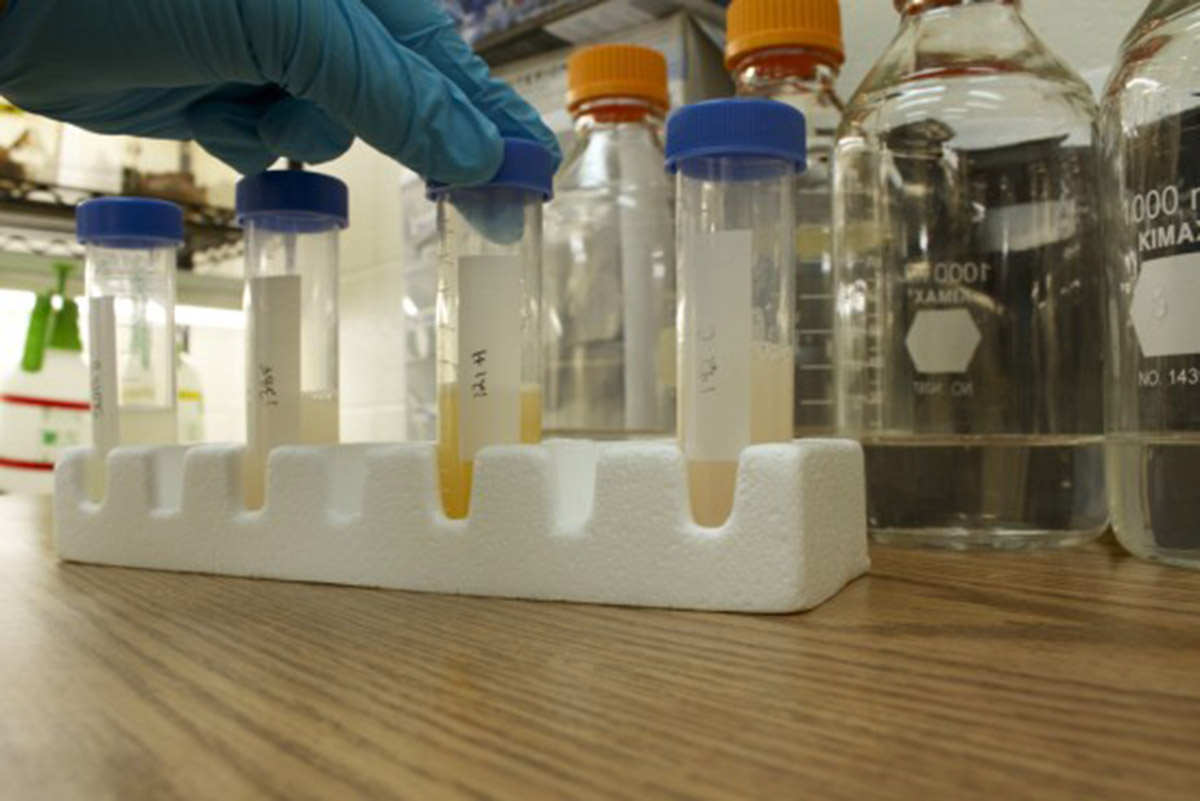Ask the staff of any inpatient care provider what the bane of their existence is and you will probably hear the same answer over and over: Clostridium difficile. Better known as C. diff, it's a species of bacteria that can run rampant in the colon after a person undergoes an antibiotic regimen that kills off the normal intestinal flora.

Pseudomembranous Colitis
Pseudomembranous colitis is a rather mellifluous name for a pretty nasty condition. When the intestinal mucosa is damaged by C. diff toxins, a layer of inflammatory fluid forms throughout the colon or large intestine. What builds up must eventually come out and come out it does in the form of foul-smelling, blood and mucous-filled diarrhea. Accompanied by abdominal cramps and fever, it ranks very low on the list of pleasant experiences in one's life.
When a person is diagnosed with C. diff, the first step is halt any currently prescribed antibiotic regimen and begin therapy with oral metronidazole. If that has no effect, the next step is to proceed with a course of vancomycin. Vancomycin can have harsh side effects on both the kidneys and ears, though, and many patients have diarrhea resume after the prescribed course, necessitating a second regimen of the antibiotic.
A Deadly Disease
Here's the kicker:
Die. And while C. diff has not been shown to be antibiotic resistant, the very nature of the infection works against curing the patient via an antibiotic regimen. Pretty much everybody has C. difficile. The Clostridium genus of bacteria, with more than 250 species, is common throughout nature. It's in soil. It's in human and animal gastrointestinal tracts. It's even a common bacteria in infected wounds.
Adding more antibiotics can kill off high levels of C. diff, but when they are stopped, you're still left with the original problem: normal gut flora gone and a few randy C. diff leftover and ready to colonize your gut once again.
Read More: Prebiotics and Probiotics: What's the buzz?
Probiotics
If antibiotics are not the solution, probiotics may be. Probiotics are any of wide variety of anti-antibiotics. Instead of killing off bacteria, probiotics work to restore the normal gut flora. They're everywhere now; from regular grocery store yogurt to concentrated capsules available by prescription or over the counter. For quite some time, probiotics such as Florastor have been prescribed alongside antibiotics in order to boost a person's gut flora and head off opportunistic infections such as C. diff.
But what do you do when the normal probiotic options don't have much effect?
Desperate Times Call for Desperate Measures
And what could be more desperate than willingly submitting to having someone else's feces inserted into your colon? Yes, fecal transplants are an actual treatment for serious cases of C. difficile. A 2013 study published in the New England Journal of Medicine found that fecal transplants were "significantly more effective for the treatment of recurrent C. difficile infection than the use of vancomycin."

Some had no symptoms at all after the first day. So, what exactly did the fecal transplant entail?
Duodenal Infusion
The first question that sprang to mind for many of these patients was probably, "how are you going to get the feces where it needs to be?" The answer, while slightly reassuring, is still not pleasant to ponder.
For each patient, a nasoduodenal tube was placed. This means a small-diameter flexible tube was inserted into the nose and pushed down the esophagus, into the stomach, through the pyloric sphincter which separates the stomach from the intestines, and into the duodenum. The duodenum is the first portion of the small intestine.
Many people gag during the procedure when something as innocuous as a nutritional supplement is to be ingested through the tube. Imagine, therefore, the difficulty of having a bag of prepared donor feces attached to one end. In fact, some of the patients in the trial at first rejected the treatment because they were so disgusted by the idea. Researchers knew they would need a more aesthetically pleasing medication route if they were to convince chronic sufferers to basically ingest another person's feces.
Other methods were attempted, including jejunal catheters and fecal enemas, but they were either not well-tolerated or didn't work as well as the nasoduodenal tube. Finally, after years of trials, researchers were able to create a gel capsule form for fecal transplant that effectively eliminated C. difficile in trial participants.
Encapsulating Feces
It's not as simple as sealing up some feces in a capsule, as one might imagine. "Freshly passed" donor feces was placed into a special solution than run in a centrifuge for a few hours, resulting in tiny pellets of fecal microbes. These microbes were then suspended in another solution and the resulting mixture was carefully placed into gelatin capsules, about half a milliliter in each one. That capsule was placed inside another capsule, then placed inside another capsule, resulting in a clean pill that would be easy to swallow, both physically and mentally.
The patients underwent a colonic irrigation prior to ingesting anywhere from 24 to 34 of the capsules over a time period of five to 15 minutes on an empty stomach. The multiple gelatin casings kept the fecal sediment intact until the capsules had reached the small intestine, resulting in optimal placement for transplant.
Every person in the trial was cured of their chronic C. difficile infection after just one round of oral treatment.
Read More: Probiotics for Kids: A Guide to a Healthier Diet for Kids
Followup testing also showed significantly increased populations of healthy gut flora and significantly decreased populations of aggressive bacteria.
Oral fecal transplant pills are an exciting step forward in the treatment of chronic intestinal infections. Researchers are looking at ways to streamline the encapsulation process in order to produce treatment on a wide scale, including freeze-drying donor stool. The next mental block to hurdle: increasing the number of people who are willing to donate.
- Photo by shutterstock.com
- Photo courtesy of Brian Gratwicke by Flickr : www.flickr.com/photos/briangratwicke/6574748763/
- www.medpagetoday.com/InfectiousDisease/GeneralInfectiousDisease/41661
- www.drugs.com/sfx/vancomycin-side-effects.html
- www.webmd.com/digestive-disorders/tc/probiotics-topic-overview
- florastor.com/
- www.nejm.org/doi/full/10.1056/NEJMoa1205037#t=abstract
- www.gpnotebook.co.uk/simplepage.cfm?ID=1503264788
- www.cbsnews.com/8301-204_162-57564470/fecal-transplants-beat-antibiotics-for-curing-diarrhea-caused-by-c-difficile/
- idsa.confex.com/idsa/2013/webprogram/Paper41627.html
- www.nbcnews.com/health/poop-pills-are-latest-way-cure-dangerous-c-diff-infections-8C11300066


Your thoughts on this